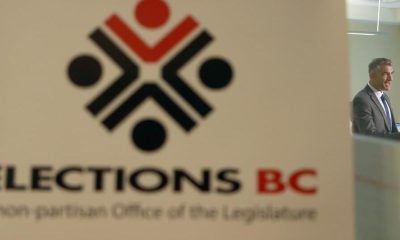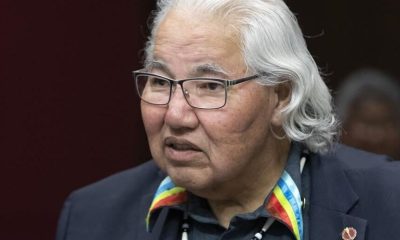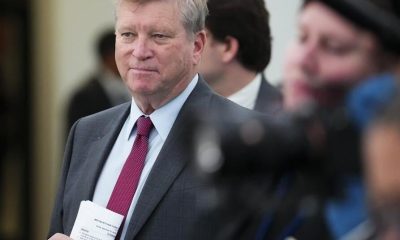Surrey Mayor Doug McCallum said bylaw officers would fine the company and drivers working in the city because they do not have business licences.
Business
Uber seeks injunction against City of Surrey
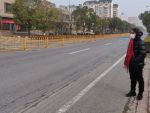
Uber has filed asked the B.C. Supreme Court to issue an injunction after Surrey Mayor Doug McCallum promised bylaw officers would fine drivers and the company for operating in the city without a business licence.
Over the weekend, the city issued 18 warnings to drivers and $1,000 in fines to Uber, and the mayor said on Monday that the grace period was over and drivers would be fined, along with the company. Uber’s head of western Canada, Michael van Hemmen, said in an emailed statement that he believes the tickets are illegal.
“The city’s actions are unfair to local residents who want to earn money and support their families. It is also unfair to those who need a safe, affordable and reliable ride,” said van Hemmen.
The requested injunction would prevent the city from fining, ticketing or otherwise sanctioning the company and its drivers for working in Surrey, pending a court hearing. Uber is also asking that the city pay the company’s court costs.
“Our preference is to work collaboratively with municipalities, and we are doing so across the region,” van Hemmen said. “However, Uber must stand up when drivers and riders are being bullied and intimidated, especially when the province has confirmed drivers have the legal right to use Uber’s app, and to earn money driving with the app.”
McCallum told reporters that he wasn’t concerned about the threat of legal action, because the city receives notices about legal action regarding bylaws on a regular basis.
“We feel that the ride hailing, or especially Uber, is not abiding by our bylaws. It does not have a business licence at this time to operate in Surrey,” McCallum said. “The same as any commercial business or any retail outlet we expect that all businesses, including commercial ride hailing companies, will respect our bylaws and will get a business licence.”
He said the city’s lawyers have told him Surrey has the legal right to fine Uber and its drivers because they don’t have a business licence.
“So, we will carry it forward,” he said.
Uber has not shied away from legal fights with other jurisdictions, such as New York City, the State of California and Sokie, Illinois.
McCallum invited Uber to apply for the same kind of business licence a taxi company must obtain to operate — taxi companies pay $161.75 a year for a Surrey business licence, plus $441.50 for each taxi — but did not say whether Uber or any other ride-hailing company would be approved if it did apply.
Uber said because the city does not have a specific business licence for ride hailing, like the ones in Vancouver, Richmond, Burnaby, Delta or the Tri-Cities, there is no licence for which to apply.
“According to provincial law, ride sharing is not taxi,” it said in a previous statement.
Minister of Transportation Claire Trevena said no municipality has the authority to block ride hailing, but they do have the ability to regulate the service through business licensing.
“Surrey has obviously gone ahead and said that the companies need a business licence, and they have not issued business licenses, and so that’s really a matter of between, I would suggest, Surrey and the companies,” Trevena said.
The type of licence the municipality requires is up to them — it does not have to be a ride-hailing business licence.
“We’ve set the framework, we’ve created these legislative amendments and made sure that we’ve got the framework in place, including the ability for municipalities to have business license or to use business as they so wish,” Trevena said. “But, it’s not up to us to say what sort of business licence the municipality is issuing and isn’t issuing.”
She also said how a city enforces its business licensing and bylaws is up to them.
When asked what would happen if a municipality did try and block ride hailing in any way, Trevena said it will be up to those who have an issue with a municipality to take legal action. However the province could come up with penalties if necessary.
Uber said although it won’t get a business licence, its app will continue to be available to those who want a ride within its Surrey service area, which includes a large swath of the city.
Uber driver Aloys Mbella, who lives in Surrey, said he had no trouble getting fares on Tuesday morning, having picked up four people within his first hour on the road. As he drove through the city, Mbella said he was not concerned about being fined and would continue to pick up customers in Surrey.
Uber said it supports an inter-municipal business licence, which is being developed by TransLink. It’s expected to be drafted within the next week, at which time it will go to Metro Vancouver municipal councils for consideration. Participation in the regional licence will be voluntary.
McCallum said he is waiting for the inter-municipal licence to be considered by the Mayors’ Council before taking action in his own city. He said he supports the process, even though he was the only mayor to vote against the licensing scheme at a Mayors’ Council meeting in December.
Surrey Coun. Brenda Locke, who left McCallum’s Safe Surrey Coalition last year and has since formed Surrey Connect, said it’s unfortunate that fines are being issued. She said the city should work with the taxi industry and Uber to make things work “in a civilized way.”
“I think Uber’s got its back up against the wall and they have to take legal action because there’s a possibility that Surrey is absolutely wrong in what they’re doing,” she said. “This is what’s going to happen when cooler heads can’t prevail and people can’t act maturely about what is going to be happening in our province.”
Coun. Linda Annis, who is a Surrey First councillor, said making bylaw officers write tickets to Uber drivers is a bad use of resources, and she is upset and disappointed by what is happening in Surrey.
“I lay it at the feet of the mayor. Certainly the bylaw officers, this is not an initiative that they would take on their own, and they obviously received instruction from somewhere, and that’s just not acceptable to me,” she said.
When it comes to legal challenges, Annis echoed Locke’s comments that they’d be better off working together.
“I think when you’re starting any relationship, it’s really, really bad to be talking about lawsuits,” she said. “We have to work collaboratively with our ride-hailing partners. It’s a service we need to have in Surrey. We need to start off in a collaborative way, not a confrontational manner.”
The Consumer Choice Center, an international advocacy group, derided Surrey’s bylaw enforcement against Uber drivers, and called it taxi industry “cronyism.”
“Going after Uber drivers does nothing but hurt consumer choice and put public safety at risk,” said the centre’s Toronto-based North American affairs manager, David Clement.
“We know from peer reviewed research that for every month ride sharing is legal, impaired driving arrests decline by 0.8 per cent. Mayor McCallum may say that he is trying to protect community safety, but the reality is that he is just trying to protect the taxi industry from competition.”
The issue of ride-hailing business licences, and whether Surrey will participate in the regional inter-municipal business licence, is expected to be discussed at the Feb. 10 council meeting.
Business
Restaurant Brands reports US$357M Q3 net income, down from US$364M a year ago
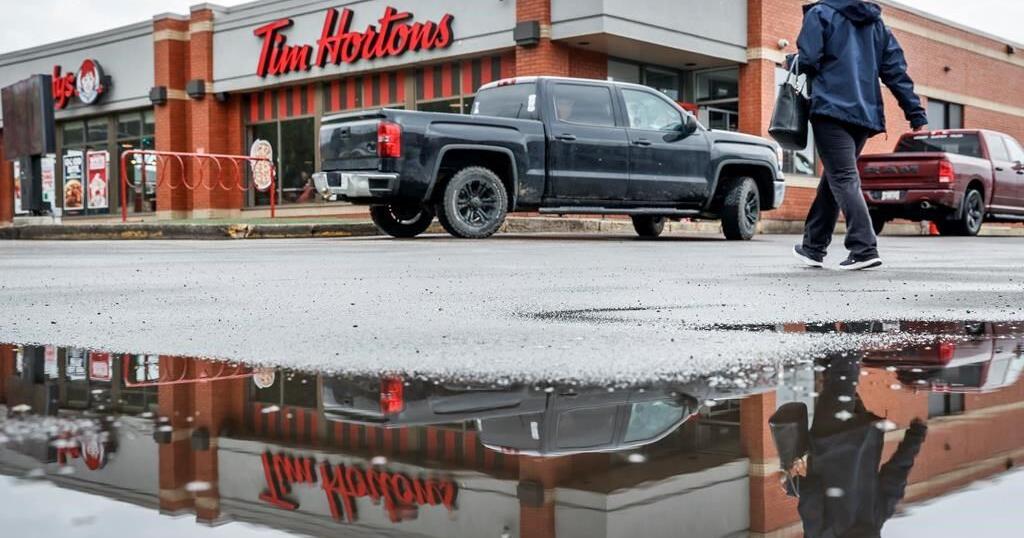
TORONTO – Restaurant Brands International Inc. reported net income of US$357 million for its third quarter, down from US$364 million in the same quarter last year.
The company, which keeps its books in U.S. dollars, says its profit amounted to 79 cents US per diluted share for the quarter ended Sept. 30 compared with 79 cents US per diluted share a year earlier.
Revenue for the parent company of Tim Hortons, Burger King, Popeyes and Firehouse Subs, totalled US$2.29 billion, up from US$1.84 billion in the same quarter last year.
Consolidated comparable sales were up 0.3 per cent.
On an adjusted basis, Restaurant Brands says it earned 93 cents US per diluted share in its latest quarter, up from an adjusted profit of 90 cents US per diluted share a year earlier.
The average analyst estimate had been for a profit of 95 cents US per share, according to LSEG Data & Analytics.
This report by The Canadian Press was first published Nov. 5, 2024.
Companies in this story: (TSX:QSR)
The Canadian Press. All rights reserved.
Business
Electric and gas utility Fortis reports $420M Q3 profit, up from $394M a year ago
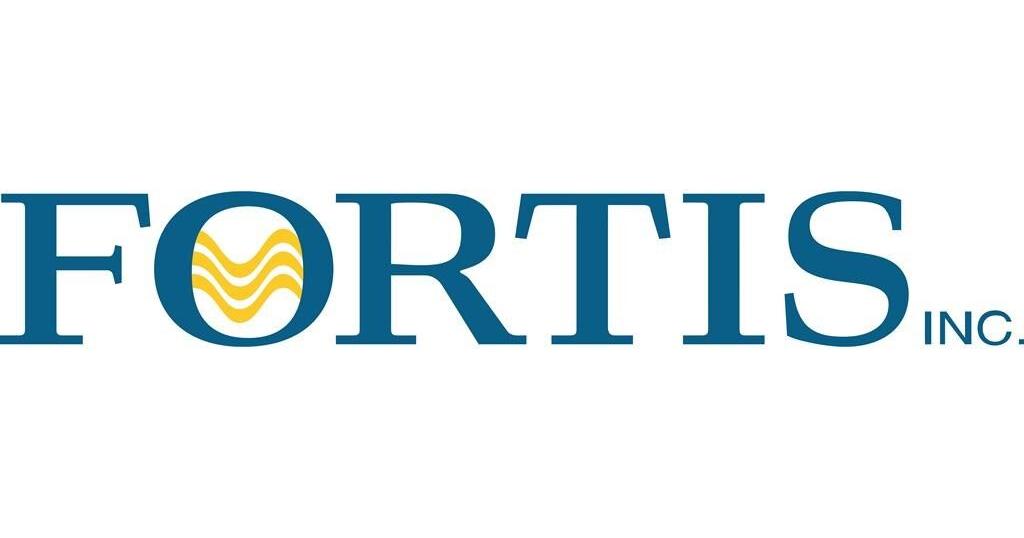
ST. JOHN’S, N.L. – Fortis Inc. reported a third-quarter profit of $420 million, up from $394 million in the same quarter last year.
The electric and gas utility says the profit amounted to 85 cents per share for the quarter ended Sept. 30, up from 81 cents per share a year earlier.
Fortis says the increase was driven by rate base growth across its utilities, and strong earnings in Arizona largely reflecting new customer rates at Tucson Electric Power.
Revenue in the quarter totalled $2.77 billion, up from $2.72 billion in the same quarter last year.
On an adjusted basis, Fortis says it earned 85 cents per share in its latest quarter, up from an adjusted profit of 84 cents per share in the third quarter of 2023.
The average analyst estimate had been for a profit of 82 cents per share, according to LSEG Data & Analytics.
This report by The Canadian Press was first published Nov. 5, 2024.
Companies in this story: (TSX:FTS)
The Canadian Press. All rights reserved.
Business
Thomson Reuters reports Q3 profit down from year ago as revenue rises
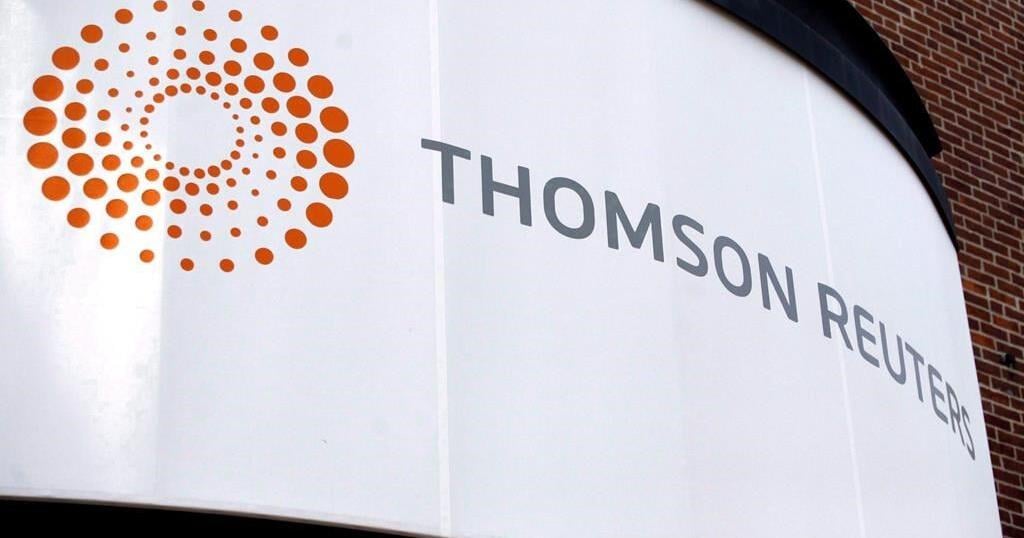
TORONTO – Thomson Reuters reported its third-quarter profit fell compared with a year ago as its revenue rose eight per cent.
The company, which keeps its books in U.S. dollars, says it earned US$301 million or 67 cents US per diluted share for the quarter ended Sept. 30. The result compared with a profit of US$367 million or 80 cents US per diluted share in the same quarter a year earlier.
Revenue for the quarter totalled US$1.72 billion, up from US$1.59 billion a year earlier.
In its outlook, Thomson Reuters says it now expects organic revenue growth of 7.0 per cent for its full year, up from earlier expectations for growth of 6.5 per cent.
On an adjusted basis, Thomson Reuters says it earned 80 cents US per share in its latest quarter, down from an adjusted profit of 82 cents US per share in the same quarter last year.
The average analyst estimate had been for a profit of 76 cents US per share, according to LSEG Data & Analytics.
This report by The Canadian Press was first published Nov. 5, 2024.
Companies in this story: (TSX:TRI)
The Canadian Press. All rights reserved.
-

 News8 hours ago
News8 hours agoJustin Trudeau’s Announcing Cuts to Immigration Could Facilitate a Trump Win
-

 News17 hours ago
News17 hours agoOfficer suspended over alleged involvement in protest at Brampton temple: Peel police
-

 Business8 hours ago
Business8 hours agoRestaurant Brands reports US$357M Q3 net income, down from US$364M a year ago
-

 News21 hours ago
News21 hours agoRustad seeks review as Elections BC says box of 861 votes went uncounted
-

 News9 hours ago
News9 hours agoNova Scotia election: Tory leader won’t invite Pierre Poilievre to join campaign
-

 News9 hours ago
News9 hours ago‘Be ready for both’: Canadians prepare for any outcome as Americans head to the polls
-

 Sports17 hours ago
Sports17 hours agoAllen nets shutout as Devils burn Oilers 3-0
-

 News8 hours ago
News8 hours agoFormer athletes lean on each other to lead Canada’s luge, bobsled teams


